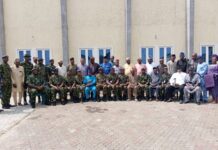By Peter Nkanga/CPJ West Africa Consultant
“If a journalist can’t fight for his own right, then he has no responsibility to fight for others,” Desmond Utomwen, a senior correspondent with TheNews Magazine/PM News, told me after a High Court judge on October 4 awarded him 100 million naira (US$637,000) in special damages from the Nigeria Police Force and Guarantee Trust Bank Plc.
Utomwen’s victory represents the largest award for any journalist in Nigeria’s 52-year history as an independent nation and sets a clear precedent for the country’s beleaguered press.
Utomwen was cruelly brutalized by several policemen in collaboration with staff of Guarantee Trust Bank on December 11, 2009, for covering a peaceful protest outside the bank’s premises in Area 3 of the capital, Abuja. The bank’s customers were protesting alleged fraudulent ATM withdrawals said to have been made by the bank’s officials, according to local journalists and news reports.
Utomwen had asked the court to declare that his fundamental human rights had been violated when he was obstructed from working; had his equipment forcefully taken; and was attacked and hit with gun butts until he was unconscious, before being bundled into a police vehicle and detained for several hours without access to medical treatment.
For two years and 10 months, Utomwen relentlessly sought justice. The case passed through two judges before reaching Justice Peter Kekemeke, who declared the actions violated the journalist’s right to freedom from inhuman and degrading treatment, right to own moveable and immoveable property, and right to freedom of the press and expression as protected in sections 34, 39, and 44 of the 1999 Constitution.
“My lawyer had to ask the previous judge to disqualify herself and the case be reassigned because it was unnecessarily being stalled. That led to this judgment,” Utomwen said.
Lashe Osoba, Guarantee Trust Bank spokesman, told me the bank would appeal the ruling. Police spokesman Frank Mba declined to comment on the case. Ugochukwu Ezekiel of Festus Keyamo Chambers, who took up Utomwen’s case on a pro-bono basis, told me that a notice of appeal cannot act as a stay of proceedings. He said a garnishment order against the police and the bank will be filed to enforce the court’s judgment.
By coincidence, on the same day Utomwen was drawing a close to his long-fought court battle, Benedict Uwalaka of Leadership Newspapers, a journalist who was assaulted on August 9, 2012, allegedly by mortuary attendants at a government hospital, received a lesson in the value of perseverance. Uwalaka’s court case came up for hearing on October 4 but was adjourned until November 13 due to power failure–just the type of frivolous delay characteristic of judicial proceedings, including Utomwen’s trial.
“The magistrate said he couldn’t see as there was no light in court. So another date was chosen,” Uwalaka told me. He said Utomwen’s victory had emboldened him in his quest for justice.
The Nigeria Union of Journalists, a party to both lawsuits, has unflinchingly supported Utomwen and Uwalaka and refused all entreaties to settle out of court. Mohammed Garba, the union’s president, told me the organization’s new strategy of seeking legal redress, as opposed to mere condemnation, is yielding dividends.
Meanwhile, Ezekiel told me he would continue to take cases of journalists assaulted in the line of duty free of charge.
Still nursing pains to his spinal cord since the attack, Utomwen reiterated his fight for justice was not for the money but the profession of journalism.
[Reporting from Abuja, Nigeria]




